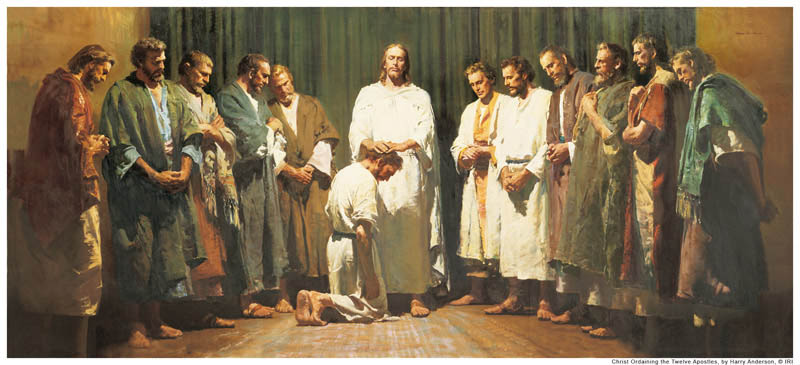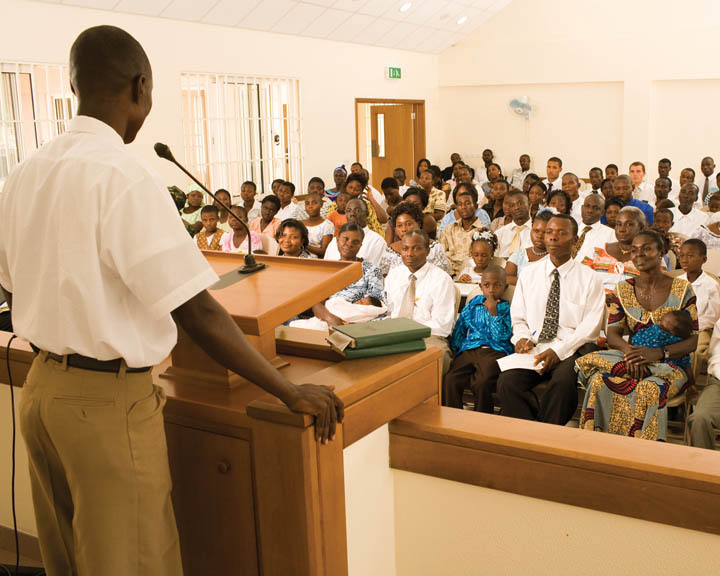Mormonism is unique for a large religion in that all its leadership roles are filled by unpaid people. Their time is donated to the church, whether they teach the toddlers or serve as the president of the entire church. This is called a lay ministry, and the concept has a great many benefits that can’t be found in a church that pays its ministers, pianists, and other church workers.
 In an earlier article, I wrote about the dangers of priestcraft. The Book of Mormon, which Mormons (a nickname for people who belong to The Church of Jesus Christ of Latter-day Saints) read along with the Bible, says, “priestcrafts are that men preach and set themselves up for a light unto the world, that they may get gain and praise of the world; but they seek not the welfare of Zion” (2 Nephi 26:29).
In an earlier article, I wrote about the dangers of priestcraft. The Book of Mormon, which Mormons (a nickname for people who belong to The Church of Jesus Christ of Latter-day Saints) read along with the Bible, says, “priestcrafts are that men preach and set themselves up for a light unto the world, that they may get gain and praise of the world; but they seek not the welfare of Zion” (2 Nephi 26:29).
In other words, it means preaching the gospel or serving in the church for personal gain, not in order to serve God. One way Mormons avoid priestcraft is by having their members volunteer their time, rather than using religious service as a paid career. Only the very highest levels of leadership work full-time for life, and if they can afford to do so, they support themselves. Many do it through pensions, savings, or help from family. If they are unable to do so, they are given a modest stipend that is not paid from tithing money. The Mormons operate a small number of for-profit businesses on which they pay taxes, and this money is used to support those leaders in need. However, they do not get a share of profits or become wealthy from the funds. It merely sustains them at a modest level, probably much less than many career ministers receive.
Besides the ability to avoid priestcraft, a lay ministry has other benefits. Following are some of the ways Mormons feel they are blessed by having a lay ministry.
Mormon Leaders Have Experiences Similar to Those They Lead
 Mormon congregations, called wards, are led by bishops, who are usually called to serve for about five years . A bishop is a lay pastor and is not the equivalent of a bishop in some other religions. He is married and often has children. He also has a secular career if he is not retired. This means that his life is very much like the lives of the people in his congregation. Since members are assigned congregations based on where they live, they also live in the same general area as the members of their flocks.
Mormon congregations, called wards, are led by bishops, who are usually called to serve for about five years . A bishop is a lay pastor and is not the equivalent of a bishop in some other religions. He is married and often has children. He also has a secular career if he is not retired. This means that his life is very much like the lives of the people in his congregation. Since members are assigned congregations based on where they live, they also live in the same general area as the members of their flocks.
A bishop is better able to advise his members concerning marriage issues because he is married himself. He understands the challenges of employment and of having to uphold high standards in a secular world. He is living a life similar to their own, so he has personal experience with their challenges.
More Mormons Get to Serve God
If you’re not a minister, when is the last time you got to give the sermon or lead the congregation in prayer? Mormons have that sort of opportunity all the time.
In most faiths, only the minister, and perhaps an assistant pastor, get to offer sermons and lead the prayers. In a Mormon congregation, everyone twelve and older gets to have that opportunity, and the children, beginning at age three, have the opportunity to do it in their own program. There is nothing cuter than to hear a sermon given by a preschooler!
Since the bishop has a busy outside life and a huge amount of work to do in the Church, we all help out. He doesn’t give the sermon every week. Instead, we take turns doing it. Since most of us aren’t professional speakers, we simplify it by keeping the sermons, which we call ‘talks,’ shorter. In a typical service, there will be three or four speakers. Often, two of them are teenagers and two are adults. The teens will speak for five minutes and the adults for ten to twenty, depending on the number of speakers.
How many teenagers do you know who would be able to stand up in front of an entire congregation and preach a short sermon? Since Mormons start doing it at age three in the children’s program, by the time they are twelve, they’ve had a lot of experience. Once a year, the children even take over the service and give little sermons or say a line or two, so they’ve had practice speaking in front of a large group.
 The Mormons have rather intense programs to teach their young people about their faith. They start attending classes at age 18 months, although the toddlers are only getting about ten minutes of lesson time and another of singing. Once they are three, they attend a 40-minute class and then group lessons called Sharing Time and Singing Time. The teenagers have a very in-depth program divided into two segments. One is Sunday School and the other is a gender-divided class on applying the gospel.
The Mormons have rather intense programs to teach their young people about their faith. They start attending classes at age 18 months, although the toddlers are only getting about ten minutes of lesson time and another of singing. Once they are three, they attend a 40-minute class and then group lessons called Sharing Time and Singing Time. The teenagers have a very in-depth program divided into two segments. One is Sunday School and the other is a gender-divided class on applying the gospel.
What is unique about the youth program is that in a recent development, it was decided the teachers would become mentors and facilitators, rather than instructors. They introduce a question and the teens research the answer in small groups. They then teach each other what they’ve learned and discuss any questions they have in the process. They decide for themselves if they need an extra week of study and they also work to have a personal experience with the topic.
This helps them learn the gospel much better because they learn how to find answers for themselves and to think about their faith in both an intellectual and spiritual way. They learn to teach, which prepares them for adult service.
Mormons Understand their Faith Well
There is so much work to do in a typical Mormon congregation that everyone has at least one job. Some serve as leaders, some as teachers, and some in other positions. The positions, called ‘callings’, rotate on a regular basis. Over a lifetime, most Mormons will have served in nearly every organization in the Church. This means they gain a clear understanding of the structure, procedures, and goals of each organization. They have a broader understanding of how the Church works.
Because so many of the callings involve teaching, Mormons are always studying their religion in order to prepare their lessons. As everyone who has ever taught knows, it is the teacher who learns the most. When I prepare a lesson, I study far more than I can put into the lesson, even if I’m teaching preschoolers. When I am finished, I always have a better knowledge and stronger testimony of the topic I’m going to teach. This motivates Mormons to go beyond passively listening on Sundays and actually digging deep into their faith.
Mormons Have Opportunities to Improve Skills
Callings are generally assigned through inspiration, not chosen by the member. This means we’re often taken out of our comfort zone and given the opportunity to learn new things. I had my first teaching assignment when I was just seventeen and had been a Mormon for a few months. I taught young adults principles of the gospel that I had to learn myself before I could teach them. I had never taught adults, but others helped me learn the skills. Shortly before I turned eighteen, I was asked to teach seventeen preschoolers, three of whom had disabilities. Two of the children were deaf and I was only in a beginning sign language class. I was struggling to succeed in my sign language class, but the need to teach and to serve as an interpreter each week caused me to improve rapidly and I quickly began to achieve top scores in my sign language classes at college.
In many religions, it is easy to show up and passively listen while others teach. Those leading and teaching receive the most blessings for their efforts. For Mormons, church membership is not passive. We are all a part of the program, and the success of the Church hinges on our participation. We serve God actively every week. It helps us to remember that Christianity should be an all-day, every-day lifestyle. I’m so grateful for the chance God has given me to serve Him in so many different ways. I am no longer the shy, timid follower I was when I joined the Church. My callings have given me new skills, taught me to lead, and strengthened my testimony of my faith.
To me, the fact that Mormons have a lay leadership is one proof that my religion is true. God would indeed plan a method to help His children grow to be so much more than they ever imagined, and to do so while serving Him. In fact, as we read the Bible, we note that Jesus didn’t choose rabbis to serve as his apostles. He chose people with secular careers who lived the lives of the people they would serve and some of them had very humble careers. He was the Savior of everyone, from the most powerful to the most humble and so he chose his leaders from among the ordinary people of the world, helping us to understand that anyone can serve God and Jesus Christ, even without a formal education in the ministry.
one proof that my religion is true. God would indeed plan a method to help His children grow to be so much more than they ever imagined, and to do so while serving Him. In fact, as we read the Bible, we note that Jesus didn’t choose rabbis to serve as his apostles. He chose people with secular careers who lived the lives of the people they would serve and some of them had very humble careers. He was the Savior of everyone, from the most powerful to the most humble and so he chose his leaders from among the ordinary people of the world, helping us to understand that anyone can serve God and Jesus Christ, even without a formal education in the ministry.
The late Terrie Lynn Bittner—beloved wife, mother, grandmother, and friend—was the author of two homeschooling books and numerous articles, including several that appeared in Latter-day Saint magazines. She became a member of the Church at the age of 17 and began sharing her faith online in 1992.






This is excellent! I like how it mentions that we all have a chance to serve God, develop our faith and improve our skills. These are all important parts of becoming like Jesus Christ. That’s our purpose as members of this church!